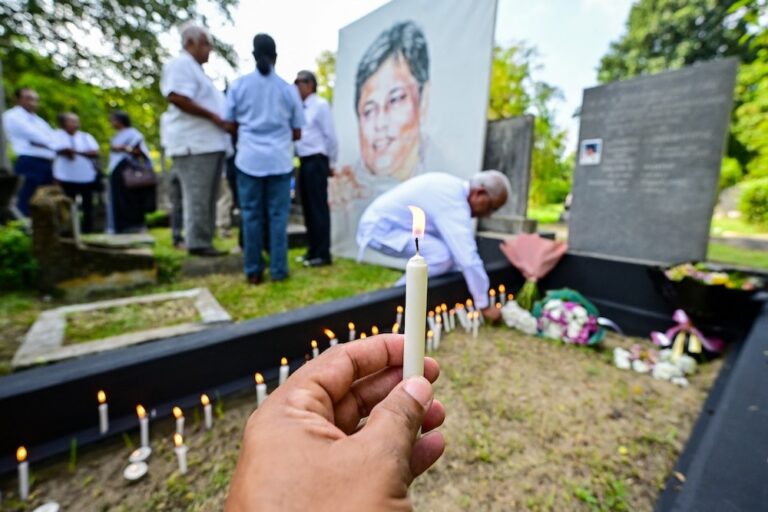(FMM/IFEX) – The publication of two articles by J.S. Tissanayagam in Sri Lanka’s monthly magazine “The North Eastern” came at a price: 20 years’ hard labour. The Editors’ Guild of Sri Lanka, the Sri Lanka Working Journalists’ Association, the Free Media Movement, the Newspaper Society of Sri Lanka, the Sri Lanka Muslim Media Forum, the […]
(FMM/IFEX) – The publication of two articles by J.S. Tissanayagam in Sri Lanka’s monthly magazine “The North Eastern” came at a price: 20 years’ hard labour. The Editors’ Guild of Sri Lanka, the Sri Lanka Working Journalists’ Association, the Free Media Movement, the Newspaper Society of Sri Lanka, the Sri Lanka Muslim Media Forum, the Sri Lanka Tamil Media Alliance, the Federation of Media Employees’ Trade Union and the South Asia Free Media Association (Sri Lanka Chapter) view this punishment as a near fatal blow to freedom of expression in Sri Lanka. The handing of such a punishment to Tissanayagam is symbolic of the intention of the state to stifle and terrorize the media as a whole while further entrenching fear in the people.
The questionable procedures followed by police in the lead up to the conviction of Tissanayagam are alarming. He was arrested on 7 March 2008 by the Terrorism Investigation Department (TID) without any reason being given. His wife and lawyers were only permitted to see him two weeks later and his detention order was issued by the Defense Secretary only on 27 March 2008.
It is against this backdrop that charges, based on a few sentences from the aforementioned articles in “The North Eastern”, were levelled against Tissanayagam under the Prevention of Terrorism Act (PTA) and the Emergency Regulations, as a result of which he was detained for over 500 days and subsequently convicted and sentenced to 20 years’ hard labour on 31 August 2009.
Tissanayagam engaged the public through his writings on ideas in which he strongly believed. His undeterred commitment to human rights was recognized when he voiced his protest locally and internationally over the government’s hard line stance during the Sinhala youth insurrection in the south in the late 1980’s. Tissanayagam’s significant role during this period of terror remains no secret. The assistance he rendered to President Mahinda Rajapakse – then a youthful opposition Member of Parliament taking flight to Geneva to take up the issue of grave human rights abuses by Sri Lanka’s army – is significant. Tissanayagam stood up for the terrorized Tamil people in the north and east in the same manner that he stood up for the terrorized Sinhalese youth of the south in the late eighties without any racial bias. Today, he remains sentenced to 20 years’ hard labour, a sentence yet to be handed down even to a convicted murderer in Sri Lanka.
Though this remains the first instance where a journalist is convicted and sentenced under the PTA, Sri Lankan journalists have been assured it will not be the last. The recent arrest of journalists from the weekly “Lanka” newspaper under this draconian legislation further establishes the government’s resolve to resort to the PTA to silence the media in Sri Lanka. This ominous practice may even extend to trade or labour unions, political parties and politicians, and civil society as a whole. Therefore, we strongly urge all trade unions and multi-ethic organizations to stand as one to oppose this threatening trend.
We urge President Mahinda Rajapakse to use the powers vested in him as president to release Tissanayagam unconditionally after inquiring into his case. The aforementioned media organizations would like to know the position of the president when appointing ex-LTTE leaders Viganayamurthi Muralidhrana as a cabinet minister and Sivaneshthurai Chandrakanthan as Chief Minister of the Eastern Province while having Tissanayagam convicted and sentenced under the PTA for merely expressing a point of view.
Finally, we urge President Rajapakse to stop all use of the PTA against the media.


